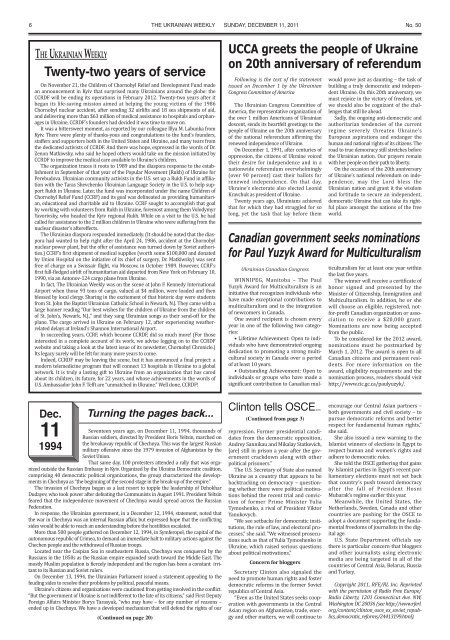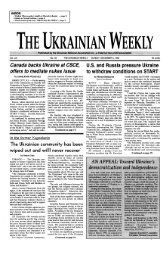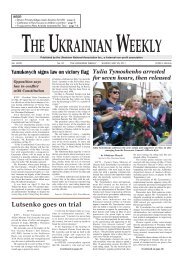Tymoshenko supporters block Rada presidium - The Ukrainian Weekly
Tymoshenko supporters block Rada presidium - The Ukrainian Weekly
Tymoshenko supporters block Rada presidium - The Ukrainian Weekly
You also want an ePaper? Increase the reach of your titles
YUMPU automatically turns print PDFs into web optimized ePapers that Google loves.
6<br />
THE UKRAINIAN WEEKLY SUNDAY, DECEMBER 11, 2011<br />
No. 50<br />
<strong>The</strong> <strong>Ukrainian</strong> <strong>Weekly</strong><br />
Twenty-two years of service<br />
On November 21, the Children of Chornobyl Relief and Development Fund made<br />
an announcement in Kyiv that surprised many <strong>Ukrainian</strong>s around the globe: the<br />
CCRDF will be ending its operations in February 2012. Twenty-two years after it<br />
began its life-saving mission aimed at helping the young victims of the 1986<br />
Chornobyl nuclear accident, after sending 32 airlifts and 18 sea shipments of aid,<br />
and delivering more than $63 million of medical assistance to hospitals and orphanages<br />
in Ukraine, CCRDF’s founders had decided it was time to move on.<br />
It was a bittersweet moment, as reported by our colleague Illya M. Labunka from<br />
Kyiv. <strong>The</strong>re were plenty of thanks-yous and congratulations to the fund’s founders,<br />
staffers and <strong>supporters</strong> both in the United States and Ukraine, and many tears from<br />
the dedicated activists of CCRDF. And there was hope, expressed in the words of Dr.<br />
Zenon Matkiwsky, who said he hoped others would take on the mission initiated by<br />
CCRDF to improve the medical care available to Ukraine’s children.<br />
<strong>The</strong> organization traces it roots to 1989 and the diaspora response to the establishment<br />
in September of that year of the Popular Movement (Rukh) of Ukraine for<br />
Perebudova. <strong>Ukrainian</strong> community activists in the U.S. set up a Rukh Fund in affiliation<br />
with the Taras Shevchenko <strong>Ukrainian</strong> Language Society in the U.S. to help support<br />
Rukh in Ukraine. Later, the fund was incorporated under the name Children of<br />
Chornobyl Relief Fund (CCRF) and its goal was delineated as providing humanitarian,<br />
educational and charitable aid to Ukraine. CCRF sought to accomplish that goal<br />
by working with volunteers from Rukh in Ukraine, foremost among them Volodymyr<br />
Yavorivsky, who headed the Kyiv regional Rukh. While on a visit to the U.S. he had<br />
called for assistance to the 2 million children in Ukraine who were suffering from the<br />
nuclear disaster’s aftereffects.<br />
<strong>The</strong> <strong>Ukrainian</strong> diaspora responded immediately. (It should be noted that the diaspora<br />
had wanted to help right after the April 24, 1986, accident at the Chornobyl<br />
nuclear power plant, but the offer of assistance was turned down by Soviet authorities.)<br />
CCRF’s first shipment of medical supplies (worth some $100,000 and donated<br />
by Union Hospital on the initiative of its chief of surgery, Dr. Matkiwsky) was sent<br />
free of charge on a Swissair flight, via Moscow, in October 1989. However, CCRF’s<br />
first full-fledged airlift of humanitarian aid departed from New York on February 10,<br />
1990, via an Antonov-124 cargo plane from Ukraine.<br />
In fact, <strong>The</strong> <strong>Ukrainian</strong> <strong>Weekly</strong> was on the scene at John F. Kennedy International<br />
Airport when those 93 tons of cargo, valued at $4 million, were loaded and then<br />
blessed by local clergy. Sharing in the excitement of that historic day were students<br />
from St. John the Baptist <strong>Ukrainian</strong> Catholic School in Newark, N.J. <strong>The</strong>y came with a<br />
large banner reading “Our best wishes for the children of Ukraine from the children<br />
of St. John’s, Newark, N.J.,” and they sang <strong>Ukrainian</strong> songs as their send-off for the<br />
plane. <strong>The</strong> cargo arrived in Ukraine on February 12, after experiencing weatherrelated<br />
delays at Ireland’s Shannon International Airport.<br />
In succeeding years, CCRF, which became CCRDF, did so much more! (For those<br />
interested in a complete account of its work, we advise logging on to the CCRDF<br />
website and taking a look at the latest issue of its newsletter, Chornobyl Chronicle.)<br />
Its legacy surely will be felt for many more years to come.<br />
Indeed, CCRDF may be leaving the scene, but it has announced a final project: a<br />
modern telemedicine program that will connect 13 hospitals in Ukraine to a global<br />
network. It is truly a lasting gift to Ukraine from an organization that has cared<br />
about its children, its future, for 22 years, and whose achievements in the words of<br />
U.S. Ambassador John F. Tefft are “unmatched in Ukraine.” Well done, CCRDF!<br />
UCCA greets the people of Ukraine<br />
on 20th anniversary of referendum<br />
Following is the text of the statement<br />
issued on December 1 by the <strong>Ukrainian</strong><br />
Congress Committee of America<br />
<strong>The</strong> <strong>Ukrainian</strong> Congress Committee of<br />
America, the representative organization of<br />
the over 1 million Americans of <strong>Ukrainian</strong><br />
descent, sends its heartfelt greetings to the<br />
people of Ukraine on the 20th anniversary<br />
of the national referendum affirming the<br />
renewed independence of Ukraine.<br />
On December 1, 1991, after centuries of<br />
oppression, the citizens of Ukraine voiced<br />
their desire for independence and in a<br />
nationwide referendum overwhelmingly<br />
(over 90 percent) cast their ballots for<br />
renewed independence. On that day,<br />
Ukraine’s electorate also elected Leonid<br />
Kravchuk as president of Ukraine.<br />
Twenty years ago, <strong>Ukrainian</strong>s achieved<br />
that for which they had struggled for so<br />
long, yet the task that lay before them<br />
<strong>Ukrainian</strong> Canadian Congress<br />
would prove just as daunting – the task of<br />
building a truly democratic and independent<br />
Ukraine. On this 20th anniversary, we<br />
must rejoice in the victory of freedom, yet<br />
we should also be cognizant of the challenges<br />
that still lie ahead.<br />
Sadly, the ongoing anti-democratic and<br />
authoritarian tendencies of the current<br />
regime severely threaten Ukraine’s<br />
European aspirations and endanger the<br />
human and national rights of its citizens. <strong>The</strong><br />
road to true democracy still stretches before<br />
the <strong>Ukrainian</strong> nation. Our prayers remain<br />
with her people on their path to liberty.<br />
On the occasion of the 20th anniversary<br />
of Ukraine’s national referendum on independence,<br />
may the Lord bless the<br />
<strong>Ukrainian</strong> nation and grant it the wisdom<br />
and fortitude to secure an independent,<br />
democratic Ukraine that can take its rightful<br />
place amongst the nations of the free<br />
world.<br />
Canadian government seeks nominations<br />
for Paul Yuzyk Award for Multiculturalism<br />
WINNIPEG, Manitoba – <strong>The</strong> Paul<br />
Yuzyk Award for Multiculturalism is an<br />
initiative that recognizes individuals who<br />
have made exceptional contributions to<br />
multiculturalism and to the integration<br />
of newcomers in Canada.<br />
One award recipient is chosen every<br />
year in one of the following two categories:<br />
• Lifetime Achievement: Open to individuals<br />
who have demonstrated ongoing<br />
dedication to promoting a strong multicultural<br />
society in Canada over a period<br />
of at least 10 years.<br />
• Outstanding Achievement: Open to<br />
individuals or groups who have made a<br />
significant contribution to Canadian multiculturalism<br />
for at least one year within<br />
the last five years.<br />
<strong>The</strong> winner will receive a certificate of<br />
honor signed and presented by the<br />
Minister of Citizenship, Immigration and<br />
Multiculturalism. In addition, he or she<br />
will choose an eligible, registered, notfor-profit<br />
Canadian organization or association<br />
to receive a $20,000 grant.<br />
Nominations are now being accepted<br />
from the public.<br />
To be considered for the 2012 award,<br />
nominations must be postmarked by<br />
March 1, 2012. <strong>The</strong> award is open to all<br />
Canadian citizens and permanent residents.<br />
For more information on the<br />
award, eligibility requirements and the<br />
nomination process, readers should visit<br />
http://www.cic.gc.ca/paulyuzyk/.<br />
Dec.<br />
11<br />
1994<br />
Turning the pages back...<br />
Seventeen years ago, on December 11, 1994, thousands of<br />
Russian soldiers, directed by President Boris Yeltsin, marched on<br />
the breakaway republic of Chechnya. This was the largest Russian<br />
military offensive since the 1979 invasion of Afghanistan by the<br />
Soviet Union.<br />
That same day, 100 protesters attended a rally that was organized<br />
outside the Russian Embassy in Kyiv. Organized by the Ukraina Democratic coalition,<br />
comprising 40 democratic political organizations, the group characterized the developments<br />
in Chechnya as “the beginning of the second stage in the break-up of the empire.”<br />
<strong>The</strong> invasion of Chechnya began as a last resort to topple the leadership of Dzhokhar<br />
Dudayev, who took power after defeating the Communists in August 1991. President Yeltsin<br />
feared that the independence movement of Chechnya would spread across the Russian<br />
Federation.<br />
In response, the <strong>Ukrainian</strong> government, in a December 12, 1994, statement, noted that<br />
the war in Chechnya was an internal Russian affair, but expressed hope that the conflicting<br />
sides would be able to reach an understanding before the hostilities escalated.<br />
More than 500 people gathered on December 12, 1994, in Symferopol, the capital of the<br />
autonomous republic of Crimea, to demand an immediate halt to military actions against the<br />
Chechen people and the withdrawal of Russian troops.<br />
Located near the Caspian Sea in southeastern Russia, Chechnya was conquered by the<br />
Russians in the 1850s as the Russian empire expanded south toward the Middle East. <strong>The</strong><br />
mostly Muslim population is fiercely independent and the region has been a constant irritant<br />
to its Russian and Soviet rulers.<br />
On December 13, 1994, the <strong>Ukrainian</strong> Parliament issued a statement appealing to the<br />
feuding sides to resolve their problems by political, peaceful means.<br />
Ukraine’s citizens and organizations were cautioned from getting involved in the conflict.<br />
“But the government of Ukraine is not indifferent to the fate of its citizens,” said First Deputy<br />
Foreign Affairs Minister Borys Tarasyuk, “who may have – for any number of reasons –<br />
ended up in Chechnya. We have a developed mechanism that will defend the rights of our<br />
(Continued on page 20)<br />
Clinton tells OSCE...<br />
encourage our Central Asian partners –<br />
(Continued from page 3)<br />
repression. Former presidential candidates<br />
from the democratic opposition,<br />
Andrey Sannikau and Mikalay Statkevich,<br />
[are] still in prison a year after the government<br />
crackdown along with other<br />
political prisoners.”<br />
<strong>The</strong> U.S. Secretary of State also named<br />
Ukraine as a country that appears to be<br />
backtracking on democracy – questioning<br />
whether there were political motivations<br />
behind the recent trial and conviction<br />
of former Prime Minister Yulia<br />
<strong>Tymoshenko</strong>, a rival of President Viktor<br />
Yanukovych.<br />
“We see setbacks for democratic institutions,<br />
the rule of law, and electoral processes,”<br />
she said. “We witnessed prosecutions<br />
such as that of Yulia <strong>Tymoshenko</strong> in<br />
Ukraine, which raised serious questions<br />
about political motivations.”<br />
Concern for bloggers<br />
Secretary Clinton also signaled the<br />
need to promote human rights and foster<br />
democratic reforms in the former Soviet<br />
republics of Central Asia.<br />
“Even as the United States seeks cooperation<br />
with governments in the Central<br />
Asian region on Afghanistan, trade, energy<br />
and other matters, we will continue to<br />
both governments and civil society – to<br />
pursue democratic reforms and better<br />
respect for fundamental human rights,”<br />
she said.<br />
She also issued a new warning to the<br />
Islamist winners of elections in Egypt to<br />
respect human and women’s rights and<br />
adhere to democratic rules.<br />
She told the OSCE gathering that gains<br />
by Islamist parties in Egypt’s recent parliamentary<br />
elections must not set back<br />
that country’s push toward democracy<br />
after the fall of President Hosni<br />
Mubarak’s regime earlier this year.<br />
Meanwhile, the United States, the<br />
Netherlands, Sweden, Canada and other<br />
countries are pushing for the OSCE to<br />
adopt a document supporting the fundamental<br />
freedoms of journalists in the digital<br />
age.<br />
U.S. State Department officials say<br />
there is particular concern that bloggers<br />
and other journalists using electronic<br />
media are being targeted in all of the<br />
countries of Central Asia, Belarus, Russia<br />
and Turkey.<br />
Copyright 2011, RFE/RL Inc. Reprinted<br />
with the permission of Radio Free Europe/<br />
Radio Liberty, 1201 Connecticut Ave. NW,<br />
Washington DC 20036 (see http://www.rferl.<br />
org/content/clinton_osce_ex_soviet_republics_democratic_reforms/24413199.html).

















